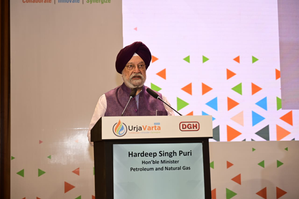Businesses
Seven Japanese varsities sign MoUs with Jindal Global University
Tokyo, April 29 (IANS) A senior delegation from India led by the Founding Vice Chancellor of O.P. Jindal Global University (JGU), Prof. (Dr.) C. Raj Kumar, concluded a successful visit to Japan with a view to strengthening and fostering internationalisation of higher education between the two countries.
The delegation, comprising deans and senior faculty members of JGU, was aimed at strengthening academic collaborations, intellectual engagement and cultural exchanges between Indian and Japanese universities.
They visited five Japanese cities — Tokyo, Yamanashi, Kyoto, Osaka and Hiroshima — interacting with the top academics and leadership teams at 14 Japanese universities represented by their respective presidents, deans and other senior leaders including at the University of Tokyo, Temple University Japan, United Nations University, International Christian University, Tokyo University of Foreign Studies, Doshisha University and Osaka Gakuin University.
The historic visit culminated in the signing of seven MoUs and Student Mobility Agreements with the following seven leading Japanese universities:
1. University of Yamanashi
2. Yamanashi Gakuin University
3. Hiroshima University
4. Ritsumeikan University
5. Ryukoku University
6. Kwansei Gakuin University
7. Kansai Gaidai University
On the success of the visit to Japan, Prof. (Dr) C. Raj Kumar, said: “Our visit to Japan had five major objectives. First, to introduce the Indian higher education system and universities to the key leaders of Japanese universities and policymakers of Japan; second, to create substantive opportunities for the students and faculty of JGU to collaborate with the leading Japanese universities; third, to build international partnerships with Japanese universities that will promote exchange programmes, joint, dual and pathways degree programmes and short-term study abroad programmes.
“Fourth, to collaborate with Japanese universities to promote research and scholarship through the advancement of faculty engagement by organising joint conferences and joint lectures leading to joint research projects and publications; and fifth, to promote collaborations among all stakeholders within Japan that includes government agencies, public institutions, private corporations, think tanks and research institutions with a view to establishing a strong intellectual presence and institutional imagination of India in Japan and for Japan in India.”
Prof. Kumar further said: “I had the amazing opportunity to address the Members of Parliament at the Japanese National Parliament. Through our landmark visit to Japan, we have reaffirmed the profound significance of the India-Japan relationship in not only shaping the continuity of historical bilateral ties between the two countries but also ensured meaningful collaboration between JGU and the leading universities in Japan to contribute significantly to global academia.”
He said: “Our collaborations with esteemed Japanese universities not only foster student mobility but also cultivate rich faculty-level engagements, enriching both nations’ academic landscapes and advancing towards a more interconnected world.”
A statement noted that this visit highlights the growing strategic importance of Japan for India in the realm of higher education.
Renowned for its excellence in innovation and research, Japan boasts world-class universities offering exceptional academic programmes. This makes Japan a highly attractive destination for Indian students seeking international higher education and exposure to cutting-edge advancements across diverse disciplines.
The MoUs and agreements comprise student mobility programmes including short-term study abroad programmes, semester exchange programmes, India immersion programmes for students from Japan to study at JGU, dual degree programmes; and faculty level engagements including joint teaching programmes, joint research projects, joint publications, joint conference and seminars to mention a few.
These initiatives will further strengthen and consolidate the strategic partnership between India and Japan in the higher education sector, the statement noted.
Prof. (Dr.) Akhil Bhardwaj, Associate Dean and Director, Office of International Affairs & Global Initiatives at JGU, said: “As we forge numerous meaningful partnerships with leading Japanese universities, we continue to expand JGU’s rich tapestry of global institutional collaborations.
“These alliances not only enrich the academic landscape at JGU but also provide invaluable opportunities for our students to participate in transformative study abroad programmes in Japan, enhancing their skill sets and enriching their career pursuits. Our commitment to fostering international connections is unwavering, ensuring that every student at JGU is empowered to thrive in an increasingly global community.”
Furthermore, Prof. Kumar delivered a landmark address to a caucus of over 20 distinguished members of the Japanese Parliament (National Diet).
This address, notably attended by the Minister of Education, Culture, Sports, and Science and Technology, Government of Japan, Masahito Moriyama, focused on critical global issues including the SDGs, global governance, India’s national education policy, and more broadly strengthening bilateral relations between the two nations.
Prof. Kumar along with the JGU delegation also had fruitful discussions on advancing India-Japan ties in the field of higher education and research with the Indian Ambassador to Japan, Sibi George and the Consul General of India in Osaka, Nikhilesh Giri.
Prof. Kumar led a high-level faculty delegation from O.P. Jindal Global University to Japan which included Prof. (Dr.) C. Raj Kumar, Vice Chancellor, Prof. (Dr.) Mohan Kumar, Dean, Strategic and International Initiatives, Professor of Diplomatic Practice & Director, Jindal Global Centre for G20 Studies, Professor Kathleen A. Modrowski, Dean, Jindal School of Liberal Arts and Humanities, Professor Padmanabha Ramanujam, Professor of Law & Dean of Academic Governance and Student Life, Professor (Dr.) Upasana Mahanta, Professor of Political Science & Dean, Office of Admissions and Outreach, Professor (Dr.) Vesselin Popovski, Professor of Law & Vice Dean, Jindal Global Law School and Executive Director, Centre for the Study of United Nations, JGU and Professor (Dr.) Akhil Bhardwaj, Associate Professor & Associate Dean and Director, Office of International Affairs & Global Initiatives.
–IANS
scr/
Businesses
India's oil & gas exploration sector offers $100 billion investment opportunity: Union Minister Puri

New Delhi, July 11 (IANS) The exploration and production (E&P) segment of India’s oil and gas sector will throw up an investment opportunity of at least $100 billion by 2030, Union Petroleum Minister Hardeep Singh Puri said on Thursday.
Addressing the ‘Urja Varta 2024’ at Bharat Mandapam here, he said, “Despite our progress much of our exploration and production potential still lies untapped within India’s 26 sedimentary basins. Despite the abundant geological resources available to us.”
“Our efforts in the past have been far short of what needs to be done in the E&P sector,” he added.
The minister also highlighted that, as of now, 10 per cent of the country’s sedimentary blocks are under exploration. Following the completion of the 10th Open Acreage Licensing Programme (OALP) round, 16 per cent would come under exploration, he added.
The Union Minister said that the government was able to control oil prices due to neutral policies.
The minister also referred to the increased purchases of oil from Russia that have helped India to keep fuel prices under control.
“There was a global turmoil. We could have followed what the West was advising us to do and not sourced oil from a particular country and then oil prices would have shot up,” the minister said.
–IANS
sps/svn
Businesses
Demat accounts surge to 162 mn in June, NSE active clients reach 44.2 mn

New Delhi, July 11 (IANS) The number of demat accounts increased to 162 million in June, jumping 4.2 million (month-on-month), a report showed on Thursday.
In the current fiscal, the average monthly demat accounts addition has been 3.4 million to date.
In June, the Central Depository Services Limited (CDSL) continued to gain market share in terms of the total number of demat accounts, according to the report by Motilal Oswal Financial Services.
On a year-on-year basis, the National Securities Depository Limited (NSDL) lost 420 bp/620 bp market share in total/incremental demat accounts, the report mentioned.
The number of active clients on the National Stock Exchange (NSE) increased 3.1 per cent (on-month) to 44.2 million in June.
Currently, the top five discount brokers account for 64.4 per cent of total NSE active clients in comparison to 58.2 per cent in June 2022.
Online brokerage Zerodha reported a 2.1 per cent increase in its client base to 7.7 million (on-month), with a 20 basis point (bp) decline in market share to 17.3 per cent.
Groww reported a 5.4 per cent increase in its client count to 10.9 million, with a 55 bp rise in market share to 24.7 per cent. Angel One reported a 3.4 per cent increase, said the report.
–IANS
na/uk
Businesses
Govt to implement e-Office in all attached, subordinate offices under 100 days’ agenda

New Delhi, July 11 (IANS) After the successful implementation of the e-Office platform in the Central Secretariat in 2019–2024, the government on Thursday said that it will be implementing e-Office in all attached, subordinate offices and autonomous bodies as part of the Department of Administrative Reforms & Public Grievances’ (DARPG) 100-day agenda.
About 133 attached, subordinate offices and autonomous bodies were identified for implementation following inter-ministerial consultations.
DARPG issued the guidelines for the adoption of e-Office in attached, subordinate offices and autonomous bodies on June 24.
In 2019–2024, the adoption of e-Office gained significant momentum in the Central Secretariat with 37 lakh files i.e., 94 per cent of files being handled as e-Files and 95 per cent of receipts being handled as e-receipts.
The government developed e-Office analytics to further deepen the initiative.
The onboarding roadmap and technical modalities were discussed in an inter-ministerial meeting chaired by Secretary DARPG, V Srinivas and attended by officials of all Ministries/Departments and Senior Officers of 133 attached, subordinate offices and autonomous bodies.
–IANS
shs/rad
Businesses
Adani Group's Vizhinjam Port receives first mothership, puts India in world league

Thiruvananthapuram, July 11 (IANS) Adani Group’s Vizhinjam Port, India’s first trans-shipment port near Kovalam Beach in Kerala, received its first mothership on Thursday.
‘San Fernando’, a vessel of the world’s second-largest shipping company Maersk, arrived at the port country with over 2,000 containers on it, thus creating history.
The giant vessel was given the traditional water salute following which it berthed successfully.
With the arrival of the first mother ship, Adani Group’s Vizhinjam Port has catapulted India into the world port business as globally this port will rank 6th or 7th.
Those present to receive the mothership included State Ports Minister V.N. Vasavan, officials from the Adani Port and senior state government officials.
The official function will take place on Friday. It will be attended by Union Minister for Ports, Shipping and Waterways Sarbananda Sonowal, Chief Minister Pinarayi Vijayan and Adani Ports and SEZ Ltd (APSEZ) Managing Director Karan Adani.
Soon after the official inauguration, the mothership will move to its next destination at Colombo and after that many more ships are scheduled to arrive with cargo.
Friday will mark the official completion of the first phase of the port, which has a 3,000-metre breakwater and 800-metre container berth ready.
Of the 32 cranes required, all but one have come. A 1.7 km approach road for connectivity is almost complete, while the office building, security area and electric lines are all ready.
Another feature of this port is that it is the first semi-automated container terminal in the country and will also be a global bunkering hub, supplying clean and green fuels like hydrogen and ammonia. Full-fledged commercial operations in the port are slated to begin in a few months.
The second and third phase of the project is planned to be completed in 2028 and will be one of the greenest ports in the world.
The port is also strategically located as it is just 10 nautical miles from the International Shipping Route connecting Europe, the Persian Gulf and the Far East.
–IANS
sg/dpb
Businesses
Retail inflation for industrial workers declines to 4-month low

New Delhi, July 11 (IANS) Retail inflation for industrial workers eased to a 4-month low of 3.86 per cent in May compared to 4.42 per cent in the same month a year ago, according to the latest data released by the Labour Ministry.
The Consumer Price Index-Industrial Workers (CPI-IW) has been steadily declining since February this year and was 3.87 per cent in April 2024, figures compiled by the Labour ministry show.
The All-India CPI-IW for May 2024 increased by 0.5 points and stood at 139.9 points. It was 139.4 points in April 2024.
The fuel & light segment declined to 149.5 points in May from 152.8 points in April 2024.
The food and beverages group increased to 145.2 points in May from 143.4 points in April this year.
The Labour Bureau, under the Ministry of Labour & Employment, compiles the Consumer Price Index for Industrial Workers every month on the basis of retail prices collected from 317 markets spread across 88 industrially important centres in the country.
–IANS
sps/svn
-
Video1 year ago
PM Modi Attacks Congress in Karnataka with “Kerala Story”
-
Cricket1 year ago
CSK players rejoice 5th IPL title with their families (Pics)
-
Politics1 year ago
Siddaramaiah & DK Shivakumar sworn in as Chief Minister & Deputy CM respectively
-
Entertainment1 year ago
Karan Deol weds his longtime Girlfriend Drisha Acharya (Pics)
-
Entertainment1 year ago
Urvashi Rautela dazzles on Cannes 2023 red carpet (Pics)
-
Entertainment1 year ago
Sunny Leone gets ready for Kennedy premiere in Cannes (Pics)
-
Entertainment1 year ago
Alia Bhatt looks crazy beautiful in Prabal Gurung creation at MET GALA 2023 (Pics)
-
Cricket1 year ago
Sakshi & Ziva Dhoni enjoy their time during CSK VS MI match

































